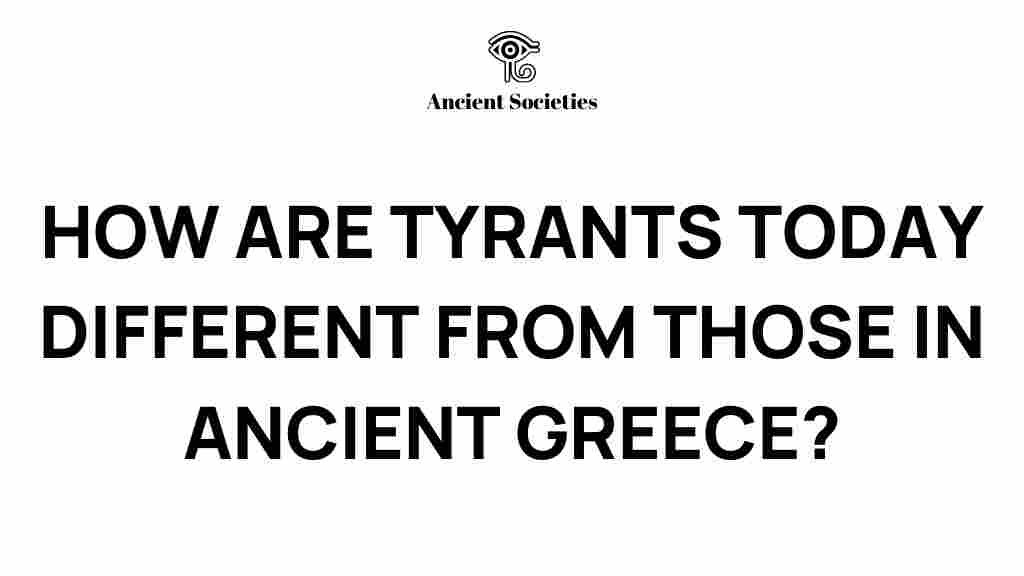Unmasking Tyranny: What Today’s Leaders Learn from Ancient Greece
The concept of tyranny has been a critical topic of discussion throughout history, particularly in the context of leadership and governance. Today, as we navigate complex political landscapes, understanding the lessons from ancient Greece can provide valuable insights. Ancient Greek philosophers and statesmen grappled with issues of political power, democracy, and societal impact, offering timeless wisdom that modern leaders can apply to current challenges. In this article, we will explore the lessons drawn from ancient Greece regarding tyranny and leadership, and how they resonate with modern politics.
The Historical Context of Tyranny in Ancient Greece
To fully appreciate the lessons from ancient Greece, it is essential to understand the historical context in which tyranny emerged. The term “tyranny” originally referred to a form of government where power was concentrated in the hands of a single ruler, often obtained through questionable means. This was distinct from democracy, where power was vested in the hands of the people.
In ancient Greece, particularly in city-states like Athens and Sparta, political power dynamics were constantly shifting. Here are some key points regarding tyranny in that era:
- Rise of Tyrants: Many early tyrants rose to power by exploiting social unrest and dissatisfaction with the oligarchies of the time.
- Philosophical Perspectives: Thinkers like Plato and Aristotle critiqued tyranny, offering frameworks for understanding governance and the role of leaders.
- Democratic Responses: The development of Athenian democracy was, in part, a response to the tyranny experienced in earlier periods.
Lessons on Leadership from Ancient Greece
Today’s leaders can draw several lessons from the governance practices of ancient Greece, especially regarding the nature of tyranny and effective leadership. Here are some key takeaways:
- Accountability: Ancient Greek leaders were often held accountable by the public. Modern leaders must ensure transparency and accountability to avoid tyranny.
- Engagement with Citizens: The Athenian model encouraged participation from citizens. Leaders today should foster civic engagement and dialogue.
- Checks and Balances: The Greeks understood the importance of checks on power. Modern governance must incorporate systems that prevent the concentration of power.
Understanding Political Power and Governance
Political power in ancient Greece was often a double-edged sword. While it could be used to enact change and foster democracy, it was also susceptible to abuse. Here are some ways that ancient Greece’s approach to governance informs our understanding of political power today:
- Power Corrupts: The old adage rings true; absolute power can lead to tyranny. Leaders must recognize the potential for corruption inherent in their authority.
- Rule of Law: The Greeks valued the rule of law, ensuring that leaders were not above the law. Modern leaders should uphold the same principles.
- Citizen Sovereignty: The idea that citizens are the ultimate source of political authority remains relevant, promoting democratic practices.
Modern Politics: A Historical Comparison
In comparing ancient Greek governance to contemporary political systems, we can identify both parallels and divergences. Here are some significant aspects to consider:
- Democracy vs. Tyranny: While modern democracies strive to empower citizens, instances of authoritarianism and tyranny still emerge, echoing ancient practices.
- Political Discontent: Just as ancient Greece saw the rise of tyranny from discontent, modern societies also grapple with political unrest and dissatisfaction.
- Philosophical Foundations: Many modern political theories are rooted in ancient Greek philosophy, providing a framework for understanding governance and tyranny.
The Societal Impact of Leadership Decisions
The decisions made by leaders have profound societal impacts, a lesson that ancient Greece illustrated through its governance. For instance:
- Social Cohesion: Effective leadership fosters unity, while tyranny breeds division. Leaders must prioritize the welfare of all citizens.
- Education and Enlightenment: The Greeks believed in the importance of education in cultivating informed citizens who could participate in governance.
- Justice and Equity: Fair governance promotes social justice, while tyranny often leads to oppression and inequality.
Step-by-Step Process for Modern Leaders
For leaders looking to avoid the pitfalls of tyranny, here’s a step-by-step process inspired by ancient Greek principles:
- Foster Civic Engagement: Create platforms for citizens to express their opinions and participate in governance.
- Establish Clear Accountability Mechanisms: Implement regular audits and evaluations of leadership performance.
- Promote Transparency: Ensure that decision-making processes are open and accessible to the public.
- Encourage Education: Invest in educational initiatives that inform citizens about their rights and responsibilities.
- Implement Checks and Balances: Develop systems that distribute power across different branches of government.
Troubleshooting Tips for Avoiding Tyranny
While the lessons from ancient Greece are invaluable, modern leaders may face challenges in applying them. Here are some troubleshooting tips:
- Engage with Dissent: Address opposition constructively rather than suppressing it.
- Monitor Power Dynamics: Regularly assess who holds power and how it is being exercised.
- Adapt to Change: Be willing to evolve governance structures in response to societal needs and demands.
- Listen to Histories: Incorporate lessons from past governance failures to inform current practices.
Conclusion: Bridging Ancient Wisdom with Modern Leadership
In a world where the specter of tyranny can loom large, the lessons from ancient Greece remain crucial for modern leaders. By understanding the dynamics of political power and the importance of governance, leaders can strive to create a society that values democracy and equality. The historical comparison between ancient practices and modern politics reveals that the challenges are not new, and with the right approach, they can be addressed effectively.
Ultimately, by embracing the principles of accountability, civic engagement, and education, today’s leaders can unmask tyranny and lead with integrity. For those interested in a deeper exploration of these themes, consider reading more about the impact of ancient philosophies on contemporary governance here. Additionally, to understand how modern politics continues to evolve, you can refer to this external resource on political power here.
This article is in the category History and created by AncientSocieties Team
